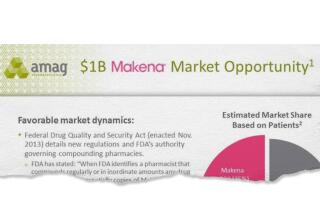FDA panel says Avandia should remain on market
- Share via
The widely used diabetes drug Avandia should remain on the market because its benefits outweigh the risks, but it should carry a strong warning about an increased risk of heart disease, a federal advisory panel said Monday.
The committee concluded that the evidence suggests an increased heart disease risk is associated with its use, but that the evidence is not sufficiently strong to require the drug’s removal from the market.
The Food and Drug Administration generally follows its advisory panel’s recommendations, but is not obligated to do so.
The panel said that certain high-risk groups should not take the drug, including people taking nitrates, such as nitroglycerin, to ease pain from angina, and those taking insulin for Type 2 diabetes.
“Physicians will have to think twice before they prescribe the drug for these people,” said the panel’s chair, Dr. Clifford J. Rosen of the Maine Center for Osteoporosis.
Avandia and another drug in the same family, Actos, already carry a warning against its use by patients with congestive heart failure, and the FDA recently asked both manufacturers to upgrade to a so-called black-box warning, giving it greater prominence.
The panel did not agree on how strong the new warnings should be.
Dr. Robert J. Meyer, director of FDA’s Office of Drug Evaluation II, said there was “a fairly unanimous recommendation that came to us,” and that the agency would evaluate it carefully in considering labeling changes.
An estimated 21 million Americans have Type 2 diabetes, which most often manifests itself after age 40 and is associated with obesity. About 1 million Type 2 diabetics take Avandia, which had annual sales of $3.4 billion in 2006. However, sales have slumped 20% since May and could further drop when additional warnings are added. The current uproar about Avandia, whose generic name is rosiglitazone, was triggered by a May report in the New England Journal of Medicine linking Avandia to a 43% increase in myocardial ischemia. Ischemia is an inadequate flow of blood to the heart caused by a partial obstruction of an artery and is often a precursor to a heart attack.
Two other analyses, one conducted by the FDA and one by Avandia’s manufacturer GlaxoSmithKline, yielded similar results, indicating that the drug increases the risk of myocardial ischemia by 30% to 40%.
The so-called meta-analyses were conducted by combining results from several studies to form a database with a large number of patients. Because of that design, panelists said the results did not conclusively prove cause and effect, but suggested a possibility that needed to be explored by more directed research.
The panel concluded, however, that the data from other existing clinical trials were insufficient to rebut the meta-analyses, and called on GlaxoSmithKline to conduct more research on the heart issues.
Dr. David J. Graham, an FDA reviewer, and Dr. Gerald J. Dal Pan, director of FDA’s Office of Surveillance and Epidemiology, had asked the panel to call for withdrawal of Avandia from the market.
Graham said that 70% of diabetics died from heart disease and argued that “any drug that increases the risk of heart disease makes no sense.” He also said that Avandia produced no unique benefits compared to other oral diabetes drugs, so there was no reason to keep it on the market.
But other speakers, including patient advocates, said the drug did have some properties that were different from other drugs. “It is vital to have as many tools in the toolkit as possible,” said Raul Fernandes, vice president of the patient advocacy group Mended Hearts.
In analyzing Avandia’s risks, Graham and Dal Pan relied on a head-to-head comparison of Avandia with Actos, which is manufactured by Takeda Pharmaceuticals.
But panel members said that data had not been peer reviewed and were presented to them in time for a full evaluation.
There are still many questions about the safety of Avandia, Rosen said, but “now we have provided at least some guidance for where the risk is.... This is not the end of the road.”






